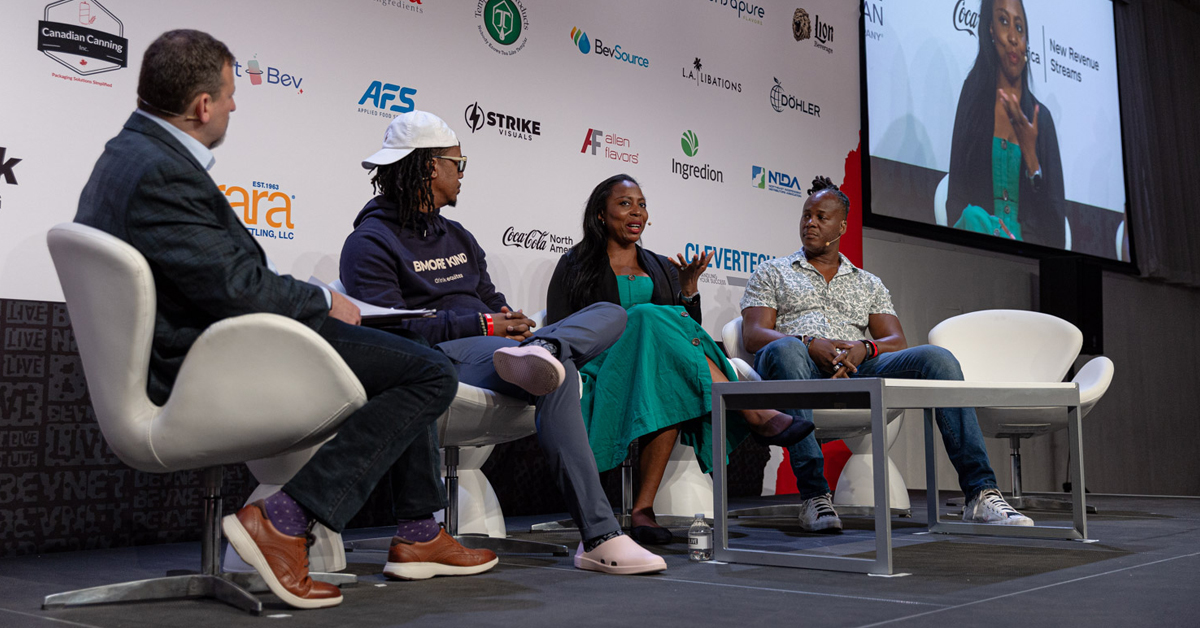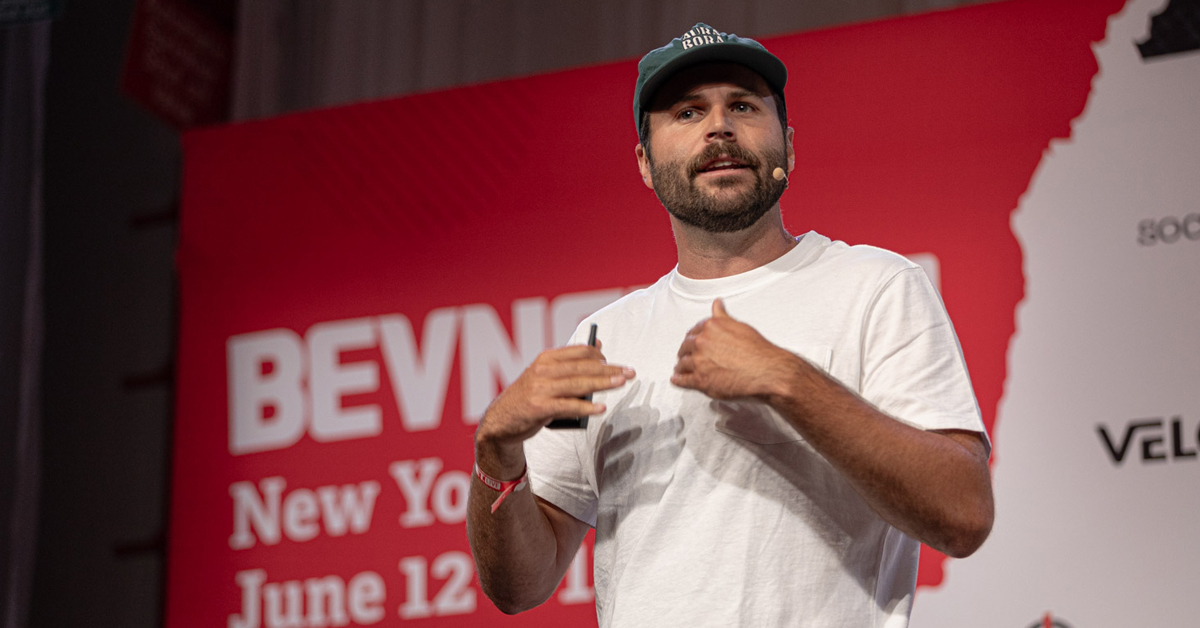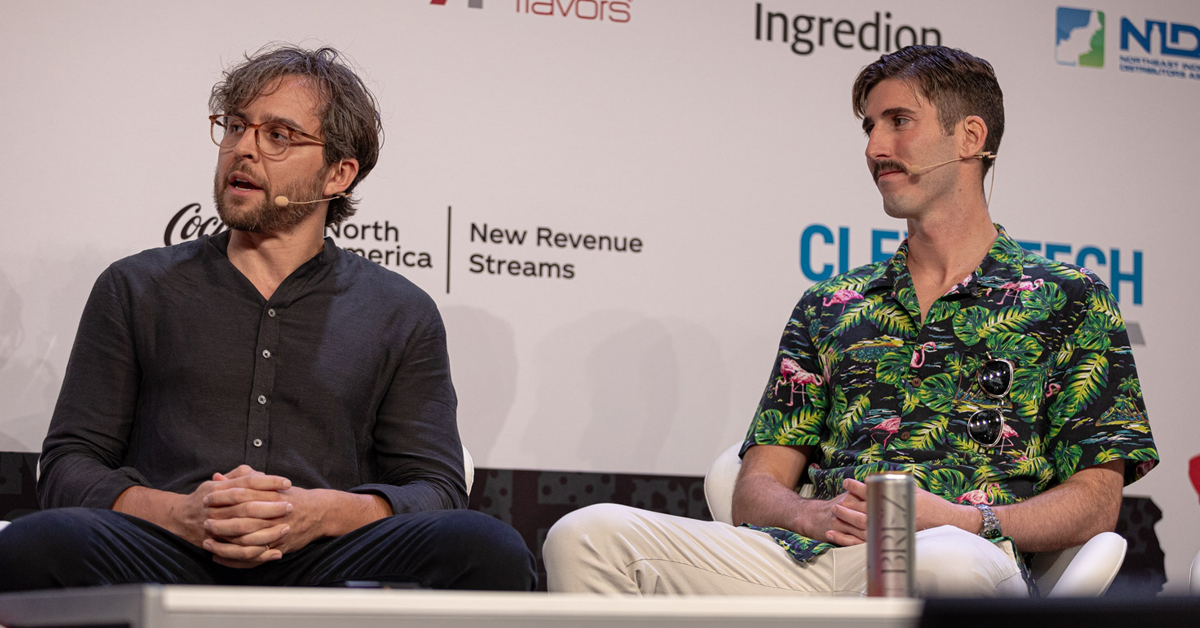On Day Two of BevNET Live Summer 2024 in New York City speakers climbed the stage to talk about operating in a tough economic climate, how to work in conjunction with retailers to scale and what it means to build a brand platform. The day’s schedule brought insightful discussions about raising capital and building community among consumers.
How Minority Founders Can Elevate the Beverage Business
As part of Day Two’s morning session, three BIPOC beverage founders spoke about how the institutional structures impeding Black and minority-owned companies can be used to create successful businesses.
“Why do we need to agree that BIPOC founders can build successful and sustainable business?” Equitea CEO and co-founder Quentin Vennie said, repeating back the first question presented to the panel. “The reality is there never should have been the narrative that we couldn’t.”
Vennie was joined on-stage by Pauline Idogho, CEO and founder of Mocktail Club, and Karl Williams, CEO and founder of Uncle Waithley’s, to discuss how they have used their lived experiences to scale their respective beverage brands.
The panel talked about how the barriers that have hindered members of the BIPOC community have instilled an engrained perseverance in how they approach entrepreneurship.
“I call it the challenger mindset,” Williams said. “You develop these skills all along the way and you’re doing the things that you have to do to figure out how to get to that next place.”
The lack of investment flowing into minority-founded brands is a significant hurdle for BIPOC entrepreneurs, partially due to the “largely homogenous” makeup of venture capital firms, Williams said.
“That doesn’t necessarily mean that to better understand a Black deal, it has to be a Black person figuring it out,” he said. “But it certainly means that if you don’t have diverse perspectives in your organization, you miss opportunities.”
For Idogho, who recently secured investment from Pronghorn, overcoming obstacles in the industry is about remaining “authentic” and building a good team, she said.
Along with surrounding oneself with capable team members, building a community within the retail and distribution partnership is a way to engrain the brand within its market.
Vennie called it leading with his humanity which he contends builds a relatability to his product that is better than any marketing campaign he could pay for.
“We really believe in attracting the world and people seeing themselves and the diversity that is America on shelves,” she said.
Idogho went even further in saying that consumers and investors want to see the diversity of America represented on shelves.
“I am a Black founder, but the product is for everyone,” she said.
The Fundraising Journey by Chapter
Aura Bora founder Paul Voge preached patience to beverage entrepreneurs seeking growth capital, equating the relationship between investors and brands to dating.
“You don’t expect to get to know someone well on the first date,” he said. “This is the same thing. I’ve met a lot of founders that talk to investors for the very first time at the moment they’re raising money. They’re probably six to 12 months too late.”
CPG investment has contracted since Spring 2022, he acknowledged.
Over the course of Aura Bora’s five investment rounds, Voge has pulled in over $10 million since 2019.
Every pitch meeting, regardless of outcome, provides valuable experience that could lead to further connections, he argued.
“Every time you talk to an investment that says ‘no’, ask them to introduce you to two other people,” Voge said. “The best part of them saying “no” is they now feel like they owe you something. And that sounds crass, but the truth is, this is a very friendly ecosystem and they probably will introduce you to exactly two friends.”
Different stages of growth require telling a different story, Voge said, but, in essence, the main goal is getting investors “to believe in your vision.”
As brands mature, more growth metrics are needed to prove the drink’s potential will meet the increased risk or size of investment.
For those in the early stages, start small and use your network, said Voge, who’s taken investment from all four of his siblings, 10 out of 11 cousins and both of his in-laws.
Why Cannabevs Matter To All Beverage Categories
This year’s BevNET Live summer conference concluded with a wide-ranging conversation on the future of cannabis drinks as it relates to the broader beverage industry.
Ian Dominguez, founder and CIO of cannabis investment group Delta Emerald Ventures, and Aaron Nosbisch, founder of infused beverage brand BRĒZ and social advertising platform LUCYD, discussed how the ascending hemp-derived category has succeeded in normalizing cannabis use across the country despite the increased regulatory scrutiny.
Dominguez pointed out that many conversations he heard at BevNET Live this week centered on changing alcohol consumption patterns and growing interest in functional drinks, to which he said cannabis beverages are a “symptom of the same root cause.”
“What’s exciting to me is the consumer’s mind and the channels themselves are melding alcohol and non-alcoholic beverages,” he said. “That is having really important implications for all brands.”
Cannabis beverages are offering something new for people who are trying to drink less alcohol but still want to “feel something,” Nosbisch added. “I think we are going to see a culture shift in a seismic way very quickly.”
Yet, as hemp beverages have leveraged new distribution partnerships in bev-alc retailers and a booming direct-to-consumer market, policymakers are scrambling to find ways to regulate the category.
Despite some regulatory hurdles, Dominguez said this was nothing new for seasoned cannabis investors like himself.
“From my perspective, I’ve been living in regulatory risk for my entire career. It’s part of the game,” he said.
Citing JUUL as a new adult-use category that was poorly regulated and faced backlash, Dominguez asserted that cannabis beverages have been outspoken in asking for responsible regulation that aligns with other age-gated categories.
“Alcohol and tobacco are extremely regulated spaces,” Nosbisch agreed. “This is nothing new, we’re just the new and emerging category that is going through the early phases.”
Recaps:
- SPINS chief sales officer Suzy Richards used data to explain how brands can use the idea of rituals to bring drinks to various parts of the day. She discussed how insurgent brands are finding opportunities by offering alternatives to static categories or carving out new ones.
- What does the chicken dance and an experiential approach to shopping have in common? They both represent core aspects of Lowes Food grocery stores, according to SVP of merchandising Glenn Figenholtz. He explained how the Southeastern-based retailer has tried to bring something unique to the grocery experience with its entertaining approach to serving its “guests.”
- On Gopuff, 40% of its grocery business is in beverages, said VP of merchandising Max Crowley, providing a great avenue for beverage brands to build consumer awareness. Crowley spoke about Gopuff’s sampling program and why driving trial is important to creating repeat customers.
- During a panel focused on the RTD spirits category, 3-Tier Beverages COO Turiya Luzadder, Tip Top Cocktails co-founder and chief brand officer Neal Cohen and Mom Water CEO Kara Woolsey talked about the opportunity in canned cocktails. The group discussed why non-carbonated options are resonating with consumers and how this format works in both on- and off-premise bev-alc retailers.
- Britt Dougherty and Ashley Selman, the co-founders of functional soda brand heywell, explained how the they used their past experiences working for big beverage companies to build a successful brand platform. The co-founders talked about solving for a drink’s “why” and how solving for a specific problem can be the hardest part of brand building but, if focused, can make the difference between success and failure.


